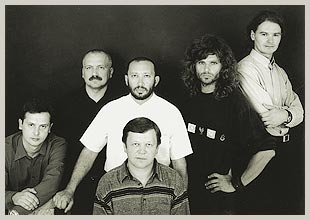
 |
|
|
 Dainius PULAUSKAS - piano, sythesizers Valerijus RAMOSKA - trumpet, flugelhorn Vytautas LABUTIS - saxes,bass clarinet Vladislav BORKOVSKI - bass Linas BUDA - drums Arkadi GOTESMAN - percussion |
Baltic BeBop One of the most creative and experimental jazz formations in Lithuania is the Dainius Pulauskas Sextet, which is composed of six incredibly talented jazzmen. On one autumn night in 1998, Dainius Pulauskas staged a fabulous performance in Vilnius, which was later released as an album titled Autumn Suite. The four-part mini-epic goes beyond demonstrating the skills of the musicians, but it is also a mixture of various sub-genres of jazz and sub-links into other genres, such as fusion, freeform, retro, progressive and classical, among others. In other words, the album is highly experimental, full of improvisations and demonstrates what Lithuanian jazz is all about. Led by pianist and keyboardist Dainius Pulauskas, the Sextet descends into hedonistic passages of free expression at one moment only to segue into a structured passage moments later. Pulauskas's use of some retro synthesizer sounds recalls the wild fusion of Joe Zawinul and Chick Corea from the 1970s, but that is only a small fragment of the mosaic of styles and sounds in this piece. At times, Pulauskas's restraint allows the other musicians to really shine, and it also shows a dedication to the composition. The Dainius Pulauskas Sextet is one of the most famous jazz bands in Lithuania. Since forming the sextet, Pulauskas has become famous as an original improviser, composer and arranger in the fusion and rock-jazz realm. One of the most fascinating aspects of this four-part piece is the work of the two percussionists. Drummer Linas Buda, a fabulous technician in his own right, is complemented perfectly by percussionist Arkadi Gotesman, himself a leading drummer. The drums and percussion play more than a backing role here; like in some of the radical fusion acts of earlier years, such as Brand X, the drums at times become the second lead, playing almost impishly in the background above the horns. A good segment of the lead is played by saxophonist-extraordinaire Vytautas Labutis. His remarkable skills enable him to go from Charlie Parker-like anarchy to a lonely alto sax soliloquy, and they show why he has become famous beyond his native Lithuania. Trumpet player Valerijus Ramoska plays a sweet horn, leading the charge often with brassy outbursts to detailed and emotional lines that bring out that autumn feel perfectly. As a bass player myself, I tend to be more critical of bassists than other musicians. However, bassist Vladislav Borkovski is extremely talented and is one of the smoothest walkers I have heard in a long time. In some of the double-time passages his work alongside the percussion is just tantalising. He even employs some choice bass chords during the opening of part three. In a way, this piece is a juxtaposition of contrasting elements. Set in somewhat of a classical structure, a fusion feel soon creates the space for unrestrained improv and silence alike, and, at times, the band even crosses over into the structures of progressive rock. At times, you can almost hear Miles Davis playing with 1970s symphonic Genesis in the latter bits of part three. The horn-sax attack, backed by a dazzling piano and walking bass, conjures up visions of more straightforward jazz; however, that is shattered and reaffirmed almost by the juxtaposition of contrasting bits, whether it comes from the sound effects, the synthesisers, the percussion or from the dazzlingly inspired playing. This four-part piece really does have an autumn feel to it, with the piano so crisp at times that it sounds like rain hitting fallen leaves on the soil. The flugelhorn recreates the melancholy that is in the slowly cooling weather and shortening days of autumn, while the sax conjures up the turbulence of such a season. The percussions take over for calamitous weather, giving the feel of thunder at the precise moments. It is always an amazing feat when musicians can create instrumental works that speak louder than words in describing scenery and environment, but this talented sextet has achieved. The fourth part sees a return to more traditional sound, a fusion sound that has everyone at their strongest. A fascinating ending to a fascinating piece. The Dainius Pulauskas Sextet is one of the most fascinating and talented jazz ensembles in the world right now. Not locked into specific styles and free to float as their imaginations allow them, they are actually pioneers in the free, but sometimes overly restrictive, genre of jazz. The Sextet has won many awards recently, and let us hope that this pushes the musicians to further success on the international jazz scene. Look out New York. Mel Huang, 10 July 2000 Baltics Editor Central Europe Review Autumn Suite was recorded live at Vilnius Jazz 98, on 10 October 1998 |
© 1988-2023 Vilnius Jazz Festival. E-mail: office@vilniusjazz.lt Phone +37069885025 |